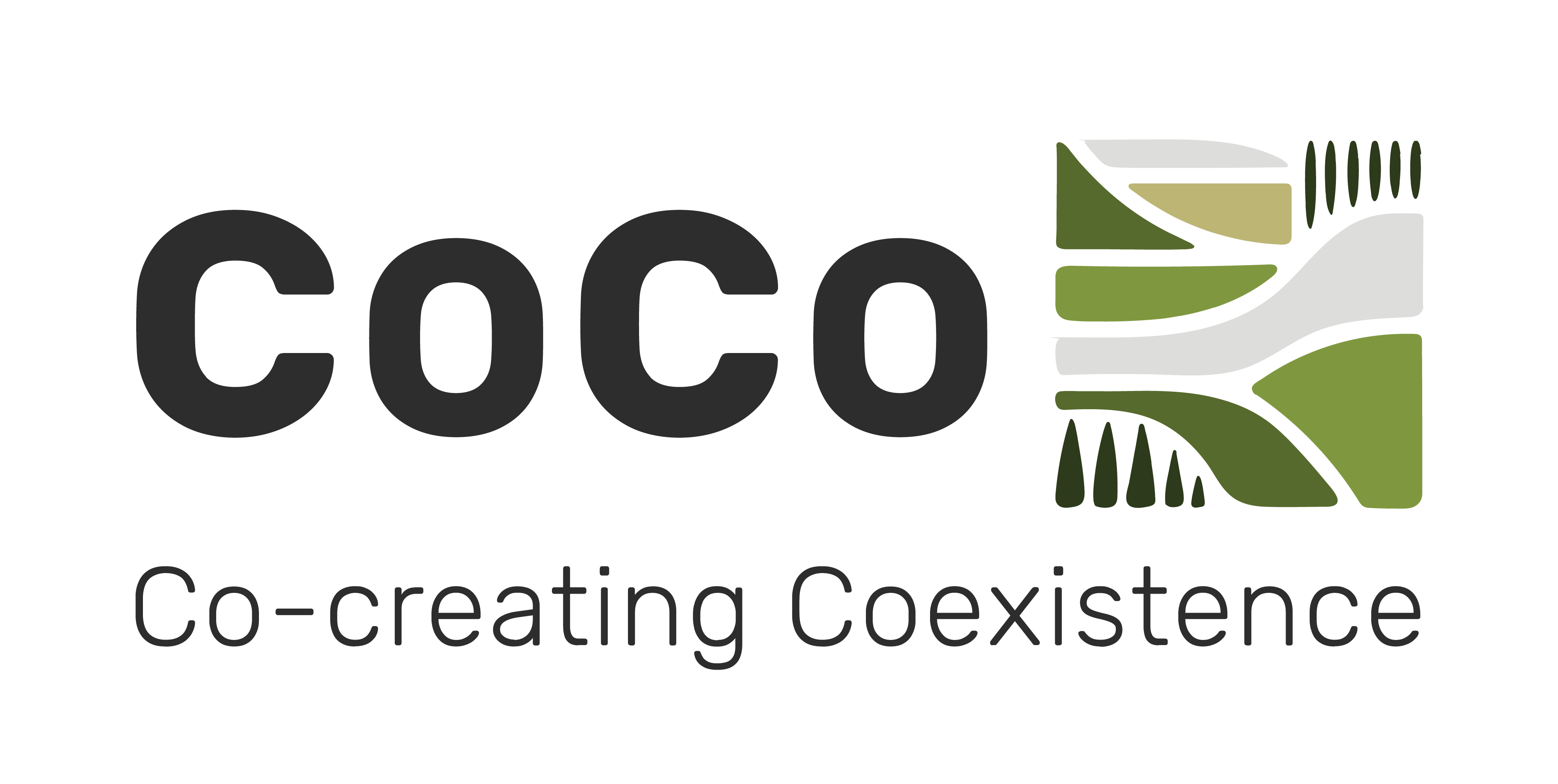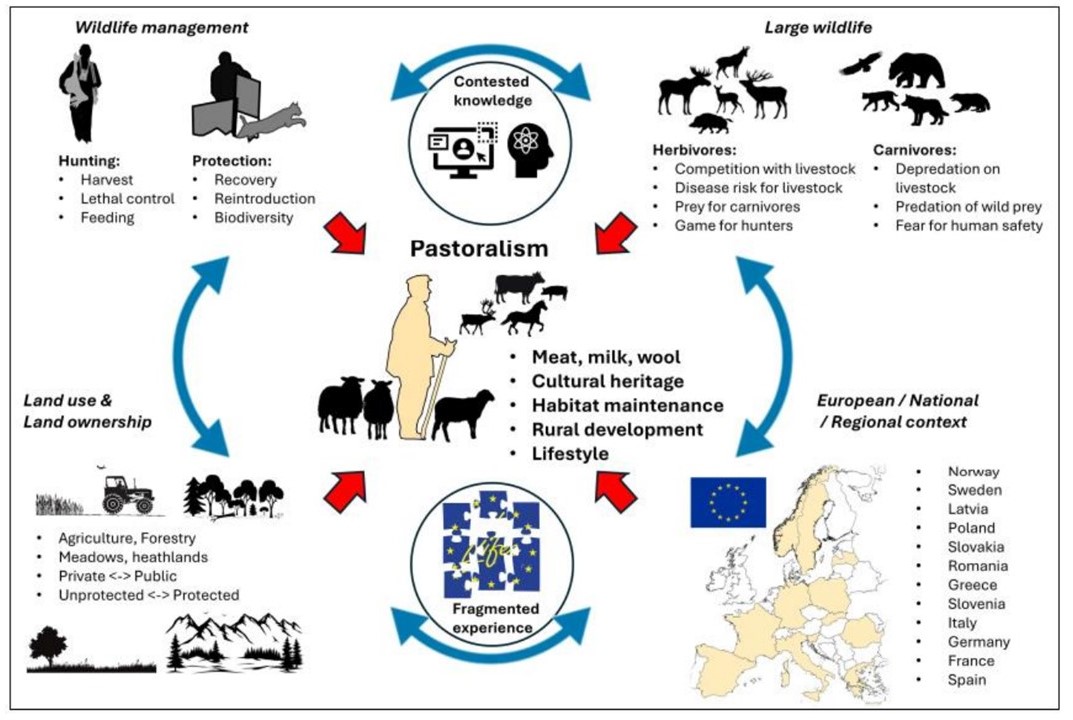Horizon 2020 programm Fair, healthy and environmentally-friendly food systems from primary production to consumption HORIZON-CL6-2024-FARM2FORK-01-1 grant ID 101181958


Project partners are University of Inland Norway (INN, Norway, leading partner), Stiftelsen Norsk Institutt for Naturforskning (NINA, Norway), Adelphi Research Gemeinnutzige Gmbh (Adelphi, Germany), Leibniz-zentrum fuer Agrarlandschaftsforschung e.v. (Zalf, Germany), Istituto di Ecologia Applicata (IEA, Italy), Universita Degli Studi di Torino (UNITO, Italy), Univerza v Ljubljani (UL, Slovenia), Kallisto Perivallontiki Organosi Gia Tin Agria Zoi Kai Fysi (Callisto, Greece), Institutul De Cercetare-Dezvoltare Pentru Cinegetica Si Resurse Montane Miercurea Ciuc (ICDCRM, Romania), Centro De Investigacion Y Tecnologia Agroalimentaria De Aragon (CITA, Spain), Institut National De Recherche Pour L’agriculture l’Alimentation et L Environnement (INRAE, France), Umea Universitet (UMU, Sweden), Latvian State Forest Research Institute "Silava", Instytut Ochrony Przyrody Polskiej Akademii Nauk (IOP PAN, Poland), European Landowners Organization (ELO, Belgium), Federazione Europea di Zootecnica (EAAP, Italy), HS Hushallningssallskapens Service Aktiebolag (HS, Sweden), Hir Skane Ab (Hir Skane, Sweden), Hushallningssallskapet Skaraborg (HS Skaraborg, Sweden), Hushallningssallskapet i Jamtlands (HS Jamtland, Sweden).
Total funding is 4,876,764.11 EUR.
Background
Pastoralism and wildlife have always had an uneasy relationship throughout the millennia following human domestication of livestock. For large parts of our common history, both pastoralists and wildlife managed to occupy the same spaces. But by the late 19th century European wildlife populations had been greatly reduced and exterminated from many areas. The early to mid-20th century saw the recovery of wild herbivore populations. Wildlife management practices centred on sustainable hunting enabled locally adapted negotiated compromises to be made between wildlife, hunting interests, and other land users such as foresters, farmers and pastoralists. The late 20th century and early 21st century have seen the return of large carnivores to the same landscapes through a combination of natural expansion and reintroductions. This has led to a wide range of direct impacts on pastoralism (e.g. loss of livestock to depredation), but also to highly polarized social conflicts about the way these wildlife species should be managed and even about the legitimacy of different land uses and activities.
The conflicts around large carnivores, especially wolves, have come to a head in recent years so that all European Institutions (European Parliament, European Commission, European Council and Court of Justice of the EU), and many national and regional governments are currently involved in very heated technical, political and legal discussions about the future of pastoralism and of the way wildlife species (especially large carnivores) are managed. Among the many dimensions of these complex conflicts is a conflict over contested knowledge surrounding the utility of different animal husbandry, wildlife management, and governance practices to reduce both the damages and conflicts.
Project objective
The CoCo project brings together different kinds of knowledge — from science, traditional practices, and personal experiences—to help people and wildlife thrive side by side.
We believe that by tapping into the best knowledge available, we can drastically reduce wildlife-related issues, calm tensions, and find a balance that benefits both people and nature.
The diverse European team, including a range of scientific partners and stakeholders, will use this collective expertise as a basis for developing policy recommendations and tools for practitioners. These will support sustainable coexistence in shared multi-functional landscapes.
For this, four activities must come together, namely:
- The compilation and synthesis of multi-disciplinary scientific knowledge and different forms of experience-based knowledge.
- The highly targeted collection and analysis of new data to robustly resolve areas of uncertain knowledge.
- Novel processes of engagement between scientists and stakeholders that can reduce conflicts over knowledge such that a consolidated consensus emerges concerning both conflicts and the pathways and mechanisms that can mitigate or resolve them.
- Promotion of understanding, cross-sectorial trust and coordination between different sectors engaged in agriculture, wildlife management and biodiversity conservation.
Project vision
The CoCo project will transform an entrenched conflict to a future state where pastoralism is valued and viable and enabled to coexist with wildlife presence in multi-functional landscapes. This will include targeted and efficient economic investments, greater policy coordination, less damage to livestock and reduced levels of social conflict between different stakeholders. This transformation will have come about through the integration of diverse knowledge systems via co-creation, the recognition of multiple shared values, and the mainstreaming of respectful and constructive forms of engagement where different stakeholders engage in collective works towards shared goals.
